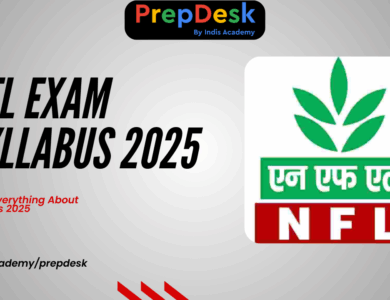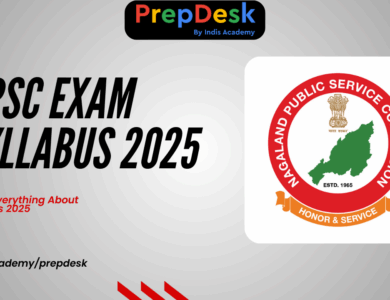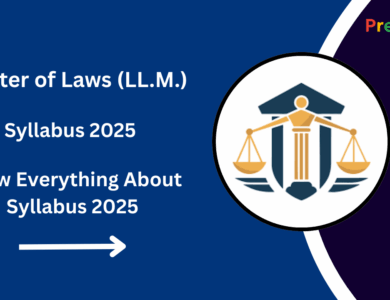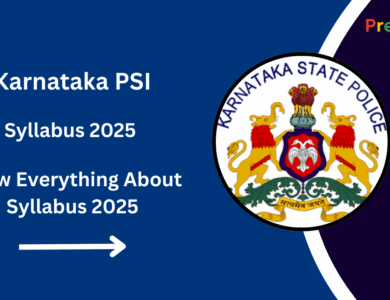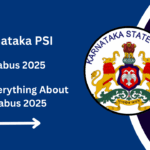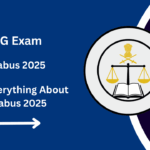B.Ed Syllabus 2025 – Complete Semester-wise Subject & Topic Details
Prepare effectively for your B.Ed exams with the updated syllabus 2025. Find detailed topic-wise syllabus, exam pattern, and PDF downloads here.
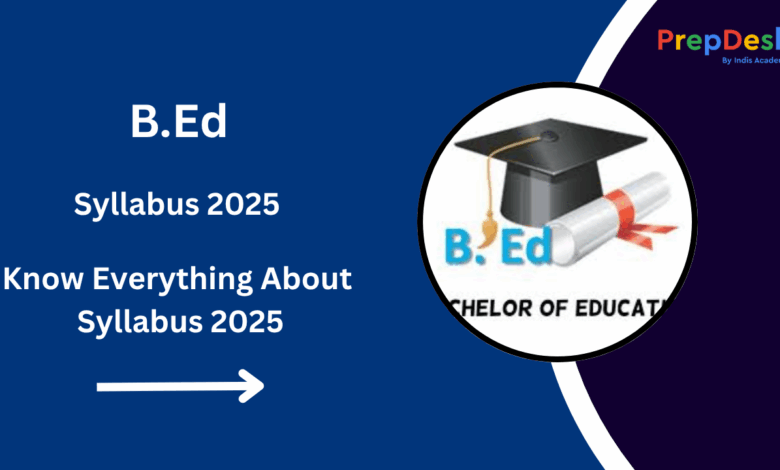
The Bachelor of Education (B.Ed) program prepares aspiring teachers with essential theoretical knowledge and practical skills to excel in the teaching profession. The syllabus covers child development, pedagogy, curriculum design, assessment techniques, inclusive education, guidance, and subject-specific teaching methodologies. This comprehensive syllabus ensures the holistic development of future educators, equipping them to address diverse classroom needs effectively.
Exam Overview
The B.Ed program is typically spread over four semesters. Each semester covers core education subjects alongside practical internships. The evaluation includes theory exams, assignments, projects, and fieldwork. The total marks are divided among semesters, focusing on both theoretical understanding and practical teaching skills.
| Semester | Subjects Covered | Approximate Marks |
|---|---|---|
| 1 | Childhood & Growing Up, Contemporary India & Education, Language Across Curriculum, Understanding Disciplines, Field Engagement | 200 |
| 2 | Learning & Teaching, Knowledge & Curriculum, Assessment for Learning, Drama & Art, School Internship I | 250 |
| 3 | Pedagogy of School Subjects I & II, ICT in Education, School Internship II | 300 |
| 4 | Gender, School & Society, Creating an Inclusive School, Guidance & Counselling, Action Research / Project Work | 250 |
Semester 1: Subjects and Detailed Topics
Childhood and Growing Up
- Stages of Development: Understanding infancy, early childhood, middle childhood, and adolescence and related changes.
- Cognitive Development: Piaget’s theory explaining how children build understanding through sensorimotor to formal operational stages.
- Emotional & Social Development: Erikson’s psychosocial stages highlighting identity formation and social interactions.
- Moral Development: Kohlberg’s stages of moral reasoning from obedience to principled ethics.
- Influences on Growth: Role of family, peers, school environment, and culture.
- Challenges of Adolescence: Identity crisis, peer pressure, and educational implications.
Contemporary India and Education
- Historical Evolution: From Gurukul to modern education.
- Constitutional Provisions: Right to education and policies ensuring educational equity.
- Educational Policies: National Policy on Education (1986), NEP 2020—vision and reforms.
- Social Issues: Caste, gender, and regional disparities impacting access.
- Globalization Effects: Privatization and technological advancements in education.
- Education for National Integration: Promoting unity through schooling.
Language Across the Curriculum
- Language Acquisition: First and second language learning processes.
- Listening and Speaking: Developing effective oral communication skills.
- Reading and Writing: Strategies for comprehension and expression.
- Multilingual Challenges: Managing diverse linguistic backgrounds.
- Cognitive Role: Language’s impact on thought processes.
- Assessment: Techniques for language proficiency evaluation.
Understanding Disciplines and Subjects
- Nature of Knowledge: Differentiating types and constructing knowledge.
- Subjects’ Scope: Role of sciences, arts, and social sciences.
- Interdisciplinary Learning: Integrating knowledge across subjects.
- Curriculum Analysis: Evaluating textbooks and content.
- Critical Thinking: Encouraging inquiry and skepticism.
Field Engagement / School Exposure
- Classroom observation focusing on teaching methods and student behavior.
- Analysis of teacher-student interactions and school management.
- Reflective journaling linking theory with practice.
Semester 2: Subjects and Detailed Topics
Learning and Teaching
- Learning Theories: Behaviorism, Cognitivism, Constructivism.
- Motivation: Intrinsic and extrinsic motivators and their influence.
- Individual Differences: Multiple intelligences, learning styles.
- Teaching Methods: Lecture, discussion, demonstration, inquiry, cooperative learning.
- Lesson Planning: Objectives, content, methodology, resources, assessment.
- Classroom Management: Discipline, engagement, time management.
Knowledge and Curriculum
- Types of Knowledge: Theoretical vs. practical.
- Curriculum Models: Tyler, Taba, and National Curriculum Framework (NCF).
- Hidden Curriculum: Implicit socialization processes.
- Cultural Influences: Curriculum’s role in societal values.
Assessment for Learning
- Assessment Types: Formative, summative, diagnostic.
- Test Construction: Designing valid and reliable tests.
- Alternative Tools: Portfolios, rubrics, peer assessment.
- Feedback Strategies: Providing constructive feedback.
- Inclusive Assessment: Adapting for diverse learners.
Drama and Art in Education
- Role of arts in cognitive and emotional development.
- Using drama, role play, storytelling for learning.
- Visual and performing arts integration.
- Planning arts-based learning activities.
School Internship I
- Classroom observation and note-taking.
- Teacher support in lesson preparation.
- Reflective journaling of school experiences.
Semester 3: Subjects and Detailed Topics
Pedagogy of School Subjects I & II
- Deep subject knowledge.
- Pedagogical methods specific to subjects.
- Use of teaching aids and technology.
- Lesson plan design and implementation.
- Addressing student misconceptions.
- Inclusive teaching strategies.
Understanding ICT in Education
- Digital tools and resources.
- E-learning platforms like SWAYAM, DIKSHA.
- Creating digital content.
- Cyber ethics and online safety.
- Blended learning models.
School Internship II
- Conducting lessons.
- Maintaining teaching records.
- Receiving and implementing feedback.
- Participating in co-curricular activities.
Semester 4: Subjects and Detailed Topics
Gender, School and Society
- Gender vs. biological sex.
- Promoting gender equity.
- Identifying and reducing gender bias.
- Preventing gender-based violence.
- Policies for gender-sensitive education.
Creating an Inclusive School
- Types of disabilities.
- Inclusive pedagogy and Universal Design for Learning.
- Legal frameworks supporting inclusion.
- Classroom adaptations.
- Teacher’s advocacy role.
Guidance and Counselling
- Concepts and objectives of guidance and counselling.
- Types of guidance: educational, vocational, personal-social.
- Counselling skills and techniques.
- Career guidance approaches.
- Mental health awareness.
Action Research / Project Work
- Identifying problems.
- Designing research methodology.
- Data collection and analysis.
- Reporting findings.
- Implementing solutions.
Recommended Books
| Subject | Author / Publisher |
|---|---|
| Educational Psychology | Anita Woolfolk, David Santrock |
| Contemporary Education | J.C. Aggarwal |
| Pedagogy | R.P. Sharma, K.K. Sharma |
| Curriculum Development | R. Mohan Singh |
| Guidance & Counselling | N.K. Chadha, H.C. Gupta |
| ICT in Education | Rajeev Kumar |
Preparation Tips
- Understand core concepts, avoid rote learning.
- Regularly practice lesson planning and teaching simulations.
- Utilize internships for real-world experience and reflections.
- Refer to recommended books and official NCERT materials.
- Solve previous exam papers to familiarize with question patterns.
- Engage in peer discussions and group studies.
- Stay updated with latest educational policies and technology trends.
Official NCERT B.Ed Syllabus (National Level)
The NCERT syllabus is widely adopted across various universities in India and provides a comprehensive framework for B.Ed programs.
Download the NCERT B.Ed Syllabus PDF:
ncert.nic.in
Conclusion
The B.Ed syllabus is designed to equip future educators with robust knowledge of educational theories, practical teaching skills, and the ability to adapt to diverse classroom needs. Mastery of this syllabus prepares teachers to contribute meaningfully to the educational ecosystem, fostering student growth and holistic development.
